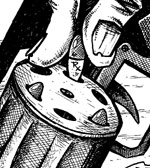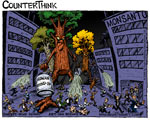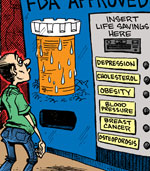Can You Get the Nutrition You Need from Natural Vitamin D3 Sources?
| Share on Facebook | Share on Twitter | Share on Google+ |
Vitamin D3 is the active form of vitamin D that is made in your skin and that appears in a small number of vitamin D3-rich foods. But can you get the amount you need without taking supplements?
Vitamin D3 Sources You Probably Won't Find in Your Health Food Store
Although our bodies make enormous amounts of vitamin D3 with the help of sunlight, there are times we just don't get enough sunlight to avoid deficiency. Anyone who lives north or south of about 35 degrees of latitude (north of Damascus, Delhi, Shanghai, Tokyo, Los Angeles, or Atlanta, or south of Sydney, Auckland, or Buenos Aires) in the winter probably needs extra D3.
Anyone who works night shifts or uses sun block on a regular basis any time of year can become deficient in vitamin D3, too. It is possible to get your D3 from natural sources. Long before supplements were invented there was an old, reliable remedy for vitamin D deficiency: Cod liver oil.
Cod Liver Oil for Vitamin D3
Cod liver oil still works. In fact, it's a popular breakfast drink in Norway and Iceland, where it comes in lemon and cherry flavors. But if cod liver is not your idea of haute cuisine, then there are other foods that are rich in vitamin D for you:
- Butter
- Cream
- Whole cow's milk (even if vitamin D is not added at the dairy)
- Various fish livers
- Mushrooms
- Beef liver, and
- Salmon, catfish, mackerel, sardines, and eel.
The amount of vitamin D3 in these foods varies greatly:
- A 3.5 oz/100 g serving of mushrooms provides about 14 IU of vitamin D. Mushrooms are the only vegan source of the vitamin.
- A 3.5 oz/100 g serving of beef livers provides about 15 IU of vitamin D.
- An egg provides about 60 IU of vitamin D.
- A 3.5 oz/100 g serving of eel provides about 200 IU of vitamin D.
- A 3.5 oz/100 g serving of tuna provides about 235 IU of vitamin D.
- A 3.5 oz/100 g serving of mackerel provides about 250 IU, the same size serving of salmon, 350 IU, catfish, 500 IU.
But a tablespoon of cod liver oil packs nearly 1500 IU of D, which is more than your body needs for maintenance for an entire day (which is as often as most people want to take it).
The Problem with Getting Your Vitamin D3 from Food
Aside from cod liver oil, most natural sources of vitamin D present one serious drawback. They don't provide reliable amounts of the vitamin. Depending on the fat content of the fish, salmon, eel, tuna, mackerel, and catfish, may have 30% less or 30% more D than expected. (Frying these fish does not add to their vitamin content.) Even orange juice and milk with vitamin D added by their manufacturers, usually providing about 100 IU of vitamin D in a 100-calorie serving, don't always have the same concentration of the vitamin. The simple fact is that vitamin D powder gets clogged up in the hoses and sprayers that add it to juice and milk.
But Why Worry About Vitamin D3 Foods? Isn't Sunlight Enough?
If you just get enough sunlight, of course, you should not have to worry about vitamin D3 in foods. However, some people don't get enough sunlight to make vitamin D. These include:
- People who live in cloudy climates. On a cloudy day, the skin makes about 50% as much vitamin D.
- People who use sunscreen. Covering the skin with sunblock with an SPF of just 8 is enough to reduce vitamin D production by 95%. The UVB rays, which are also thought to be connected to skin cancer, are the spectrum that activates production of the vitamin.
- People who live in extremely hot climates that encourage them to stay indoors. Vitamin D deficiency is surprisingly common in the US state of Georgia.
- People who are over 70. After age 70, the skin contains up to 75% less 7-dehydrocholesterol, the chemical the body activates with sunlight to make vitamin D.
- People who take statin drugs to lower cholesterol. Their skin has less of the 7-dehydrocholesterol used to make vitamin D, and their livers are so busy dealing with the statin drugs that they do not transform vitamin D into calcium-regulating hormones.
- People of African ancestry. The darkest skin makes only about 10% as much vitamin D as fair skin.
If you fit into these categories, you probably need to eat vitamin D-rich foods every day or to take a vitamin D supplement every day. But if you can't load up on cod liver oil, fish, beef liver, eggs, and mushrooms, you may find it easier to take a supplement.
Selected References:
Bowerman, Susan. If Mushrooms See the Light. 2008-03-31. Los Angeles Times.
Koyyalamudi, SR; Jeong, SC; Song, CH; Cho, KY; Pang, G (2009). Vitamin D2 formation and bioavailability from Agaricus bisporus button mushrooms treated with ultraviolet irradiation. Journal of agricultural and food chemistry 57 (8): 3351–5.
-
Skin CareMen Skin Care
-
Free ResourcesFree eBooks
-
Every human being is the author of his own health or disease.Buddha
-
Featured Health SupplementTotal Balance
 contains approximately one thousand, two hundred and seventy five times LESS lead than 1 tablet of the Vitamin Shoppe product.
contains approximately one thousand, two hundred and seventy five times LESS lead than 1 tablet of the Vitamin Shoppe product.
-



















